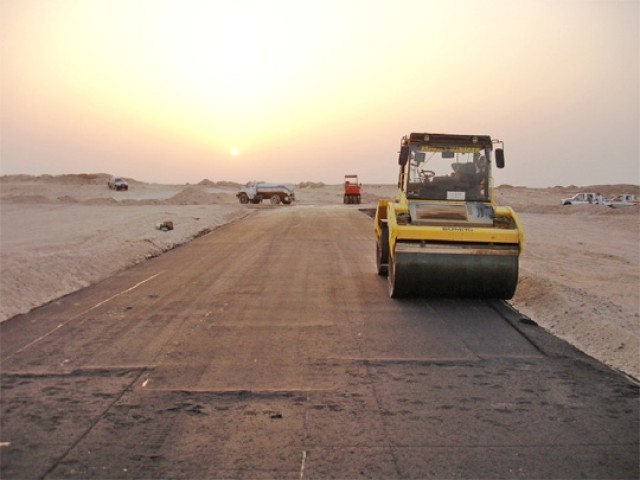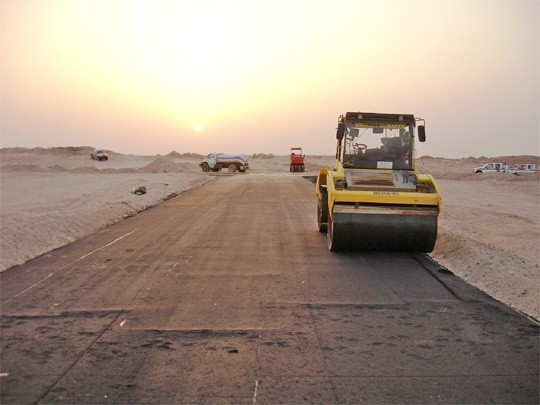BASRAH, Iraq, Feb. 2, 2007 - For the U.S. Army Corps of Engineers, opening lines of communication is just as important as constructing a hospital or a police station or building a new water treatment plant.
The USACE Gulf Region South (GRS) District has the mission to provide an all-weather paved surface road through 175 kilometers of the southern desert of Iraq, known as MSR (main supply route) Aspen.
"Aspen Road will be a two-lane asphalt road, 180 kilometers in length, stretching from MSR Tampa in northwest Basrah to the Kabari Police Station at the Iraq-Kuwait border," said Michael Wojcickki, the project engineer with the GRS Basrah Area Office.
Wojcickki described how the road will be built over 23 kilometers of existing asphalt and be widened from 6.5 meters to eight meters, and overlaid with an additional five centimeters of asphalt.
In addition to the 85 kilometers of existing road, crews will add 30 centimeters of base coat and 10 centimeters of asphalt. The road will be smoothed, graded and given a hard surface.
The $30.4 million refurbishment project will make it easier for military transports to carry goods from Kuwait City to MSR Tampa by shortening the travel time for convoys heading north toward Baghdad, and is expected to be completed in March.
"Although Aspen Road is designed mainly for military use, it will in fact free up more space for civilian traffic on other roads," Wojcickki said. He added that the road construction has created about 200 jobs using local contractors. "So you are putting money into the pockets of the local citizens. Money they badly need."
According to Natalie Sudman, another GRS project engineer, the preparation work is very important.
"The contractors will level the ground and put down the sub-base that's compacted," she said. "If you don't take care of the lower level, the road won't last. You need a good strong foundation that can hold the road up."
Over the past several decades, neglect and the lack of new construction has left many roads in deplorable condition, many with little more than one- or two-lane dirt paths rendered impassable when the rains come. The reconstruction work will enhance Aspen Road's safety, improve its alignment and provide a reliable route, Sudman said.
She noted that Iraq will benefit from the improved road and safe access because it will "help by taking the heavy traffic (tracked vehicles) off the road and saving other highway projects.
"These improvements will greatly facilitate enhanced operations at this site. We applaud the Iraqi team with whom we have closely worked in making this challenge become a reality," Sudman said.
As the reconstruction gains momentum, it is essential that a transportation network provide efficient movement of essential products such as construction materials, equipment, fuel and other supplies, said an Iraqi project engineer working with GRS.
"As with nearly all reconstruction efforts, this program uses local contractors thereby directly contributing to rebuilding Iraq's infrastructure by providing work for local businesses and putting money directly into the local economy," he said.
To help shorten his re-supply distance, the contractor built an asphalt plant near the project site for faster access to the paving materials.
"Otherwise we would have to bring the asphalt from a long distance that is remote and dangerous," the engineer said. "The plant produces about 160 metric tons per hour. The project is important, not only for economic reasons, but for humanitarian good as well. We cannot ignore the importance of good roads."
The project's completion will benefit not only the Basrah Province, but also all travelers who have had to endure the years of bad roads.


Social Sharing